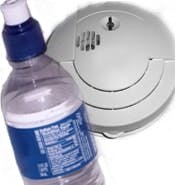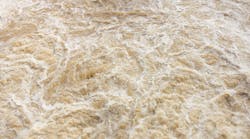QT 5, Inc., the manufacturer of nicotine water, will face a legislative committee to dispute that its product promotes addition and endangers children when, in fact, the company reported that the product's sole purpose was to allow smokers to have nicotine in designated nonsmoking areas, reported an article in the Portland Press Herald.
The hearing before the Health and Human Services Committee will discuss whether or not a bill should be passed that would ban NICOWater from store shelves in Maine.
NICOWater is "meant for adult smokers when they can't smoke (each bottled is about two cigarettes worth of nicotine), like in an airplane, a train, around children or things of that sort," said David Rosen, a lawyer for the company based in Westlake Village, Calif. NICOWater failed to receive approval from the FDA in 2002 to be a dietary supplement.
Sen. John Martin, sponsor of the bill, said that the product, containing 4 milligrams of nicotine in a half-liter bottle, allows people to continue their nicotine habits when he believes the habit should be discouraged all together. His hope is that the committee recommends passage of the bill, and the full Legislature banishes the drink from Maine.
Currently, the only retailer in Maine selling NICOWater is Rite Aid, which has 80 stores in the state. Nationwide, opposition to the nicotine-laced water is growing. Groups argue that the nicotine is too strong and that there are no laws to govern this product. A coalition of anti-smoking groups across the country is petitioning the federal government to investigate NicoWater, while officials in Westchester County, N.Y., are considering restricting the sale of the product.
The International Bottled Water Association (IBWA) emphasizes that water-based products that contain nicotine and are intended for drinking are not considered by federal regulatory authorities to be "bottled water" and are not produced, marketed or regulated as such. The FDA regulates bottled water as a packaged food product with specific standards for quality, labeling and manufacturing practices, among others that relate to all foods including the bottled water category. Packaged waters with nicotine content are not considered bottled water, since they do not meet the applicable FDA regulatory requirements and standards required of bottled water products.
In previous correspondence on the matter, FDA's Center for Food Safety and Applied Nutrition (CFSAN), the FDA branch responsible for the regulation of conventional foods, nutritional products and dietary supplements, concluded that nicotine is not recognized as an approved food additive, nor is it Generally Recognized As Safe (GRAS), a classification applied to ingredients added to conventional food products. Bottled water is classified as a "conventional food," reported IBWA.
QT 5, which bought the license for NICOWater shortly before the FDA review, took the product off the market for about a year for retooling and is now advertising the product as a homeopathic remedy under FDA guidelines, Rosen said.
Rosen said the company has taken great pains to discourage children from drinking NICOWater, with a child-resistant cap, labeling that says the product is not for sale to minors and a price that would be prohibitive to most young people–about $8.99 for a four-pack.
If the bill passes, QT 5 would seek legal recourse to ensure that NICOWater remains available to the people of Maine, Rosen said.
Source:
Portland Press Herald; IBWA

